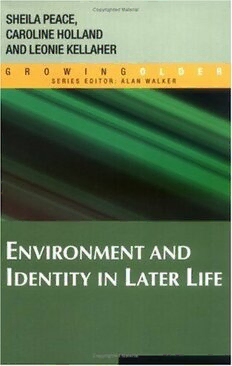
Environment and Identity in Later Life (Growing Older) PDF
191 Pages·2005·0.982 MB·English
Most books are stored in the elastic cloud where traffic is expensive. For this reason, we have a limit on daily download.
Preview Environment and Identity in Later Life (Growing Older)
Description:
Throughout life, our everyday interactions with material, social, and psychological environments influence our self identity: and ‘who we think we are’ influences how we behave in particular places. In later life, people bring to this relationship a lifetime’s experience that makes certain associations more or less important. This book explores the relationship between environment and identity for older people. In this detailed ethnographic study, older people talk in depth about their situations and experiences of space and place. The book examines the experience of men and women of different ages and cultures living in a range of different kinds of places, including ‘ordinary’ and ‘special’ housing - from a high-rise flat to a residential care home - in semi-rural, urban and metropolitan locations within the Midlands and south-east England. This research enables us to appreciate how older people manage their needs within the context of their whole lives. Many are able to achieve a ‘life of quality’ as they constantly engage and re-engage with their environment. The discussion of how environmental complexity influences people in developing and maintaining their own identity is essential for those involved in planning, designing, caring and supporting people as they age. Environment and Identity in Later Life is key reading for students, practitioners and policy makers interested in quality of life for older people.
See more
The list of books you might like
Most books are stored in the elastic cloud where traffic is expensive. For this reason, we have a limit on daily download.
